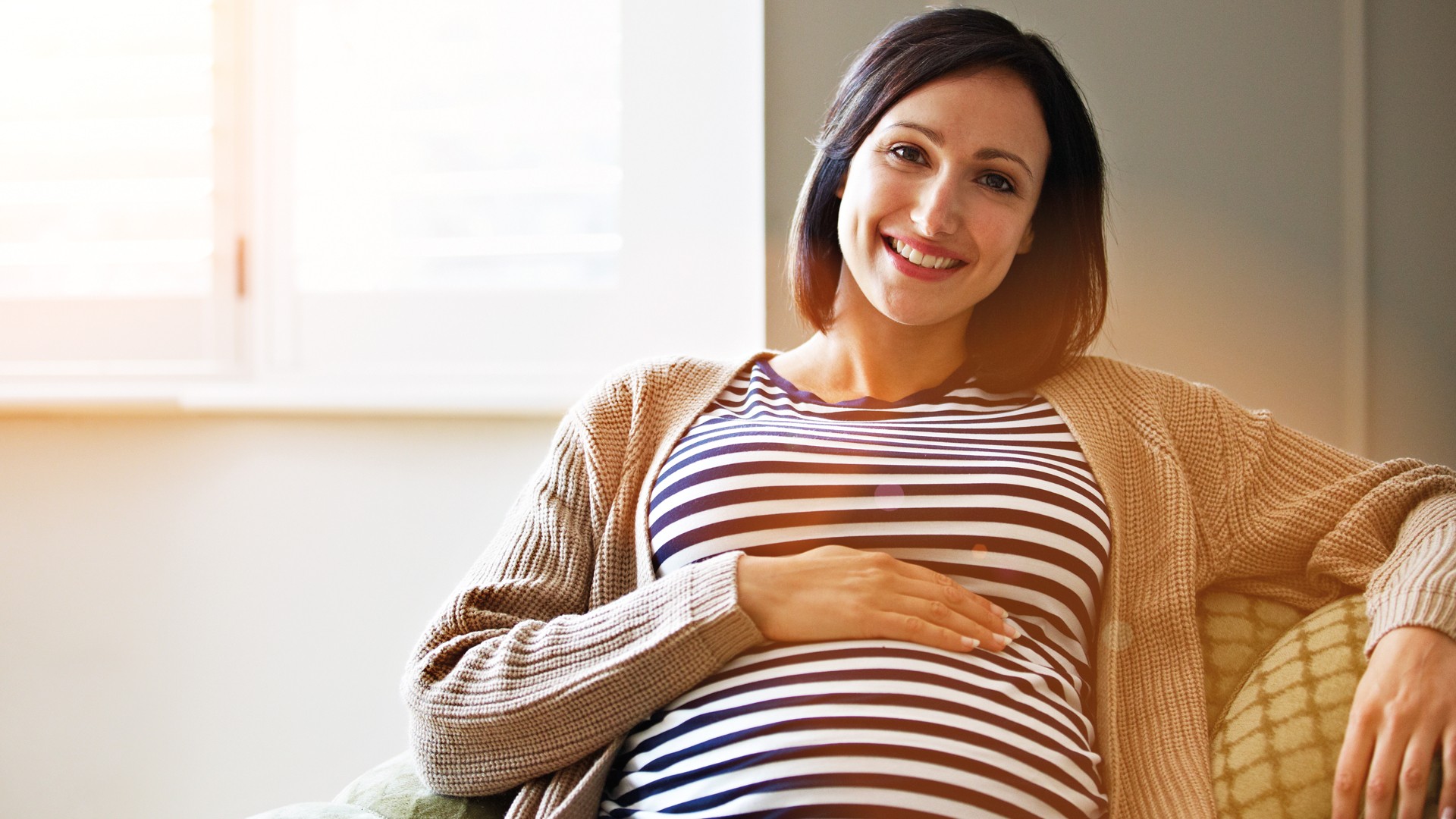In OTC Category Reviews
Follow month by month updates on topics including asthma, mental health and skin conditions and be able to provide informed advice to customers at the counter.Bookmark
A baby’s first 1001 days are crucial for long-term health and development. Pharmacy teams can be on hand with advice and support for parents at each stage from conception to pregnancy and beyond
It’s globally recognised that the first 1001 days in a child’s life – from conception until two years of age – are a critical time for their cognitive, emotional and physical development. Babies and young children are especially vulnerable to their environment during this period. They need to be encouraged and supported by their parents and carers to develop good communication and social skills, and their health and development needs to be monitored. If developmental delay isn’t addressed early, this could cause significant problems later on.
In March 2021, the Department of Health and Social Care published its ‘The Best Start For Life: a vision for the 1001 critical days’ report. It found that many parents, carers and their families struggle to find the support when they need it most. It can be difficult to know what’s available in their local area, and also how to find trustworthy advice online.
"Shaping a child’s environment affects their health, happiness and educational potential," says Sally Hogg, head of policy and communications at the Parent-Infant Foundation and coordinator of the First 1001 Days Movement. "Parental mental health and quality of interactions with children are important, and how healthcare professionals interact with young children helps to model interactions. These first 1001 days can be a stressful time for parents, leading to huge vulnerability and change. There’s a need for parents to have a safe space where they feel comfortable enough to discuss any concerns."
Support focus
While support for families is available in England through various healthcare professionals, including GPs, midwives, health visitors and social workers, there is currently no joined-up approach. The Covid-19 pandemic has led to reduced services, with some parents reporting loneliness and a loss of social connections as a result.
The Best Start For Life report includes six action points to address current issues and improve health outcomes for babies and children in England.
- Seamless support for families: a coherent joined up Start for Life offer available to all families
- A welcoming hub for families: Family Hubs as a place for families to access Start for Life services
- The information families need when they need it: designing digital, virtual and telephone offerings around the needs of the family
- An empowered Start for Life workforce: developing a modern, skilled workforce to meet the changing needs of families
- Continually improving the Start for Life offering: improving data, evaluation, outcomes and proportionate inspection
- Leadership for change: ensuring local and national accountability and building the economic case.
According to the First 1001 Days Movement’s consensus statement in July 2021, there needs to be better funding across maternity, public health, children’s and mental health services. "The Government’s report is a vision about how to put a system in place to provide better care," says Sally. "It is largely about creating universal services and making public services more effective and efficient. No other reports have focused holistically on the first 1001 days, so this is a good start. Now it needs to be embedded in Government policy, with Government spending attached to it and actual policy drivers to make this a reality. There also needs to be more workforce in place, especially with the NHS backlog, and we need to know which cabinet minister will have responsibility for this."
The Best Possible Start report states that all parents and carers will be told exactly what support they can expect to access, right from the very moment they know a baby is on the way, in order to help them prepare as best they can. Universal support will be available to all, while Universal+ will offer extra support to vulnerable families.
Public Health England has committed to modernising its Healthy Child Programme, which includes health promotion, child health surveillance and screening, led by health visitors. There are also plans to improve how parents experience digital, virtual and telephone-based services. Baby health, development and vaccinations have always been monitored through the Personal Child Health Record, commonly known as the Red Book. However, in its current paper format, the Red Book is easily lost, and there is no opportunity for parents to personalise it to suit their needs. There are now plans to roll out a Digital Personal Child Health Record for every new birth by April 2023, which will help in providing a joined-up approach to healthcare for each child.
Critical timing
While The Best Start For Life report has been welcomed by organisations and healthcare professionals, it does have some limitations. "The 1001 Days report has very good recommendations about babies and families, but it’s important to discuss the whole period from conception, with a focus on pregnancy and postnatal care," says Elizabeth Duff, NCT senior policy advisor. "There need to be clear messages and consistent information for pregnant women and their families. For example, while women are pregnant or breastfeeding, they need to be taking appropriate supplements for that time."
NICE updated its antenatal care guideline in August 2021, covering the routine antenatal care that all women and their babies should receive. It now focuses on more engagement with maternity services earlier in the pregnancy and, for the first time, the role that partners play in supporting pregnant women. After all, a healthy pregnancy can help to set up an unborn baby for a healthy life, laying down the foundations of positive emotional and physical health.
"Studies have shown that in their first three years of life, children are at their most sensitive to any influences both positive and negative," says Dr Nauf AlBendar, Doctor of Clinical Medicine in DOHaD & Founder of The Womb Effect. "Experiences during that time get under the skin and shape the brain. Therefore, these experiences have important and long-lasting consequences and are directly related to a child’s long-term cognitive, emotional and social outcomes through adulthood. No other stage of childhood is more dependent on the external environment for growth and development."
Healthy lifestyles
Pregnant women may be given conflicting advice about healthy lifestyle choices, especially by well-meaning family and friends. It’s therefore important that all healthcare professionals can provide evidence-based advice. Pregnant women should be taking folic acid and vitamin D supplements, for example, and avoid certain foods such as unpasteurised dairy products, liver and raw/undercooked meat.
Dr AlBendar says pregnant women shouldn’t necessarily be eating for two in terms of quantity, but the quality of their nutritional intake should be at optimal levels. "A well-balanced pregnancy diet includes vegetables, fruits, meat, fish, seafood, eggs, poultry, nuts, beans, pulses, seeds and healthy fats," she explains. "Some essential nutrients are omega 3s, folate (B9), choline, vitamin D, prebiotics and probiotics. Exercising regularly during pregnancy is also important, as sedentary behaviours have been shown to elevate the risk of high blood pressure, caesarean sections, lower back pain and greater weight gain, as well as gestational diabetes. It also alters the future health of the unborn baby in terms of cardiac function, body fat and physical coordination."
Pharmacies can recommend and signpost any relevant products and services. For example, Dr Nisa Aslam, a London-based GP, recommends that pregnant women quit smoking as soon as possible and avoid drinking alcohol. "Smoking increases the risk of miscarriage and pregnancy complications and can harm the baby," she says. "If women are trying to conceive or are already pregnant, it’s safest not to drink any alcohol at all. If they don’t wish to give up drinking, then it’s a good idea for them to cut back on drinking. Alcohol can increase the risk of miscarriage, stillbirth, premature birth, small birth weight, and foetal alcohol spectrum disorder (FASD)."
Pregnant women may not be aware that they should reassess their caffeine intake as well. "Although pregnant women are typically advised not to consume more than 200 milligrams of caffeine (two cups of coffee) a day, several studies are urging the current recommendations to be re-evaluated," says Dr AlBendar. "No amount of caffeine has been found to be risk-free during pregnancy. Caffeine readily crosses the placenta to the developing foetus, which generally lacks the enzymes that are required to metabolise it."
Medicines and vaccines
Many women stop taking essential medicines during their pregnancy, which could be putting their and their baby’s health at risk. While some medicines should be avoided during pregnancy or while breastfeeding, others are still crucial to control acute or underlying chronic conditions. Women often get minor ailments in pregnancy, such as backache, headaches and heartburn, and need to know which medicines they can take safely, and when. The community pharmacy team is well-placed to offer this advice and refer to the pharmacist where necessary.
"Women need to be moved away from the blanket approach of ‘don’t take anything’," says Elizabeth. "For some women, taking medicines in pregnancy is extremely important if they have underlying conditions. It’s been noted in maternal mortality reports that some pregnant women are dying from epilepsy seizures as they have stopped taking their medication, believing it to be harmful. Some medicines may not be safe in the early stages of pregnancy, but may be safe in later pregnancy or while breastfeeding. Women with severe sickness in pregnancy, for example, can be treated safely without harming their baby. It’s a woman’s decision, but they should speak to their midwife, GP and/or obstetrician about it."
Some vaccinations are important in pregnancy and Dr Aslam recommends that women check their rubella vaccine status with their GP or practice nurse before they try to conceive. "During pregnancy, they will be offered a flu jab and whooping cough jab," she says. "It’s important to have these as they protect the health of the mother and baby. The Covid-19 vaccine is considered safe to have during pregnancy and it offers pregnant women the best protection against Covid-19."
New parents should be advised to speak to their health visitor about the childhood immunisation schedule, which starts in babies from eight weeks of age.
Pregnancy and Covid jabs
All pregnant women are being encouraged to get the Covid-19 vaccine, after data from the NHS in July 2021 revealed that the overwhelming majority of pregnant women hospitalised with Covid-19 have not had a vaccine. In contrast, no pregnant women with both doses of the vaccine had been admitted to hospital.
According to the Royal College of Obstetricians and Gynaecologists (RCOG), more than half of women who test positive for Covid-19 in pregnancy have no symptoms, but pregnant women can be prone to serious illness and complications in the later stages of pregnancy, especially if they have underlying health conditions.
According to the UK Obstetric Surveillance System (UKOSS), one in five women admitted to hospital with serious Covid symptoms went on to give birth prematurely, and the likelihood of delivery by caesarean section doubled. One in five babies born to mothers with Covid symptoms were also admitted to neonatal units.
"Every day, our members are seeing very sick pregnant women with Covid-19 in hospital and the majority are unvaccinated," says Dr Edward Morris, president of the RCOG. "We want to reassure pregnant women that Covid-19 vaccines are the safest and best way to protect you and your baby from severe illness and premature birth. One dose of Covid-19 vaccination gives good protection against infection, so the sooner you can book your first appointment the better. You can have your second dose eight weeks after your first, which will provide a good level of immunity against the Delta variant."
Support and signposting
The UK has one of the lowest breastfeeding rates in Europe. According to The Best Start For Life report, all parents and carers should have access to infant feeding support, including help for breastfeeding, advice and early diagnosis of issues such as tongue-tie, and help with formula feeding if that’s more appropriate. Sally suggests placing contact details of local breastfeeding counsellors next to the baby feeding sections in the pharmacy, as a lot of breastfeeding support is run by the voluntary sector. If parents can’t or don’t want to breastfeed, the First Steps Nutrition Trust website has useful information on formula milks and bottle feeding.
The mental health and wellbeing of mums, dads, partners and carers is also crucial for a baby’s development. NHS England currently provides a six- to eight-week postnatal health check for new mothers through GPs, including a specific focus on mental health and wellbeing. However, in April 2021, new research by the NCT revealed that a quarter of new mothers are still not being asked about their emotional or mental health, despite GP practices in England now being funded to do so. The survey found that the routine six-week checks focused mainly on the baby’s health, and only 15 per cent of the mothers had an appointment that was focused on their own health and wellbeing.
"It is quite common to feel a variety of emotions during pregnancy and after childbirth,” says Dr Aslam. “Some women feel tearful, anxious or even low in mood. Gentle exercise and self-help apps can help, and some women find it beneficial to join support networks, such as the NCT. If women are feeling persistently anxious or low mood, it’s very important that they get in touch with their GP or midwife as soon as possible."
Community pharmacies are often the first port of call for pregnant women and new parents looking for health advice. "Pharmacy staff are in an ideal position to discuss potential problems and normalise them. Ask new parents, ‘Are you OK? Do you need anything?’," says Sally. "Some babies cry and don’t sleep with no underlying medical reasons, and parents need support to help them cope in difficult times without necessarily finding a solution. Signpost them to the NHS website, as well as the Baby Buddy app, which is approved by the NHS. The NCT has a lot of information, as well as the Tommy’s website. Speaking to other parents is important. If pharmacies have the space, they could put up posters for community parent-to-parent support and a noticeboard for local Facebook groups and baby groups and activities."
Sponsored
 Sponsored education
Sponsored education
A different approach to pain
Complete this interactive video to rethink your pain recommendations and ensure you offer every customer the most appropriate advice
 Sponsored education
Sponsored education
Helping vapers find a path to quit
Help vapers find a path to a nicotine-free life when they are ready to quit with the first NRT product licensed for this indication


Record my learning outcomes